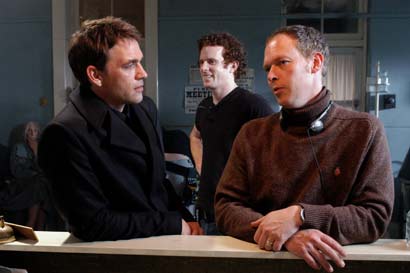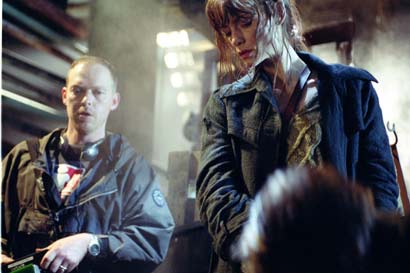“It's brutal and unfair, exactly like the film world.”
|
My lecturers were Redon Tomkins (painting), Barry Cleavin (printmaking), Bill De Friez (film), Glenn Busch (photography) and Denis Dutton (art history). My peer group consisted mainly of Paul Swadel and Sam Miller. One of the key things about the school when I was there (apart from the free use of gear) was the peer group. There were many talented and thoughtful people and that all just added to the vibe and the idea generating. In fact, that was the best thing about the school, that and Denis Dutton's art theory paper. In the film department it was a very disparate group, everyone being influenced by hugely different things, from the surrealist film-making of Jan Svankmeyer to the war films of Sam Fuller, from David Lynch to the experimental cinema of Mia Dyren and Japanese body horror. There was, as I remember it, very little in the way of local influences and in fact the whole school seemed heavily influenced by international trends – and the key tutors were foreigners. Personally, I dug this, because it allowed maximum exposure to different approaches to film. And I'd spent years getting Alice In Videoland to courier movies down to Dunedin (Fellinis, Buñuels etc) – that was my primary and extensive film course – so by the time I turned up to Ilam, I was educated in film history. I met Paul Swadel there, who became one of my best mates and produced my first short, and Francis van Hout, (who was working for Canta at the time I was at art school) and became Lenny Minute in my third-year film, Lenny Minute One. I got a B. Being a naturally humble soul, I took the lecturer to the University Council, saying the mark was unfair. I think I won and it was upgraded to a A- or something. Then I sent it away to the Cannes Film Festival myself (you can do that with Cannes – you don't need to go through some big funding body), and it got into the short film competition. That was an education; it sums up many things about film, that little story. I probably learned most from the prelim year where I had to do not just film but all the other disciplines. And while I think it's reasonable to allow students direct entry into the film studio without the prelim year, for me it was a powerful experience, from the painting studio, which tempted me, to learning printmaking from one of the best exponents in the country, to the rigour and intellectual spice of Denis Dutton's art theory paper. He was the first person who got me to literally read all of Plato's Republic, and I'd studied it about three times before that! That prelim year really steeled me for all the hard work ahead; anyone who's been through it knows it's not a relaxing year as around half are failed, but it sure focuses the mind. It's brutal and unfair, exactly like the film world. Toughens you up. I came to art school to make films, and that's what I did. I spent my final year working in the industry in Wellington. My first real gig was co-directing the comedy series Skitz and setting up an animation department at Gibson Group (the producers of the show), taking the techniques used on Lenny Minute. All the while I was writing and in 2000 finally got to make my first feature, The Irrefutable Truth about Demons. Certainly without art school I would have missed meeting two of my favourite people in the world, Francis van Hout and Paul Swadel, and that's really what it's about – the people you meet there. Certainly the film gear was good at the school and that really enabled me to produce work at a reasonable technical level. I was there at the time there was a meningitis outbreak and, while working on Lenny Minute One, I actually caught it (or a variation, they could never tell – nearly killed me). Paul Swadel went on to teach at Waikato Polytechnic, but as part of the course he used to go, 'Hey, do you know how hard you have to work to make films? Look at this guy, he nearly died from meningitis making Lenny Minute. That's how obsessed you have to be!' |
||||||


